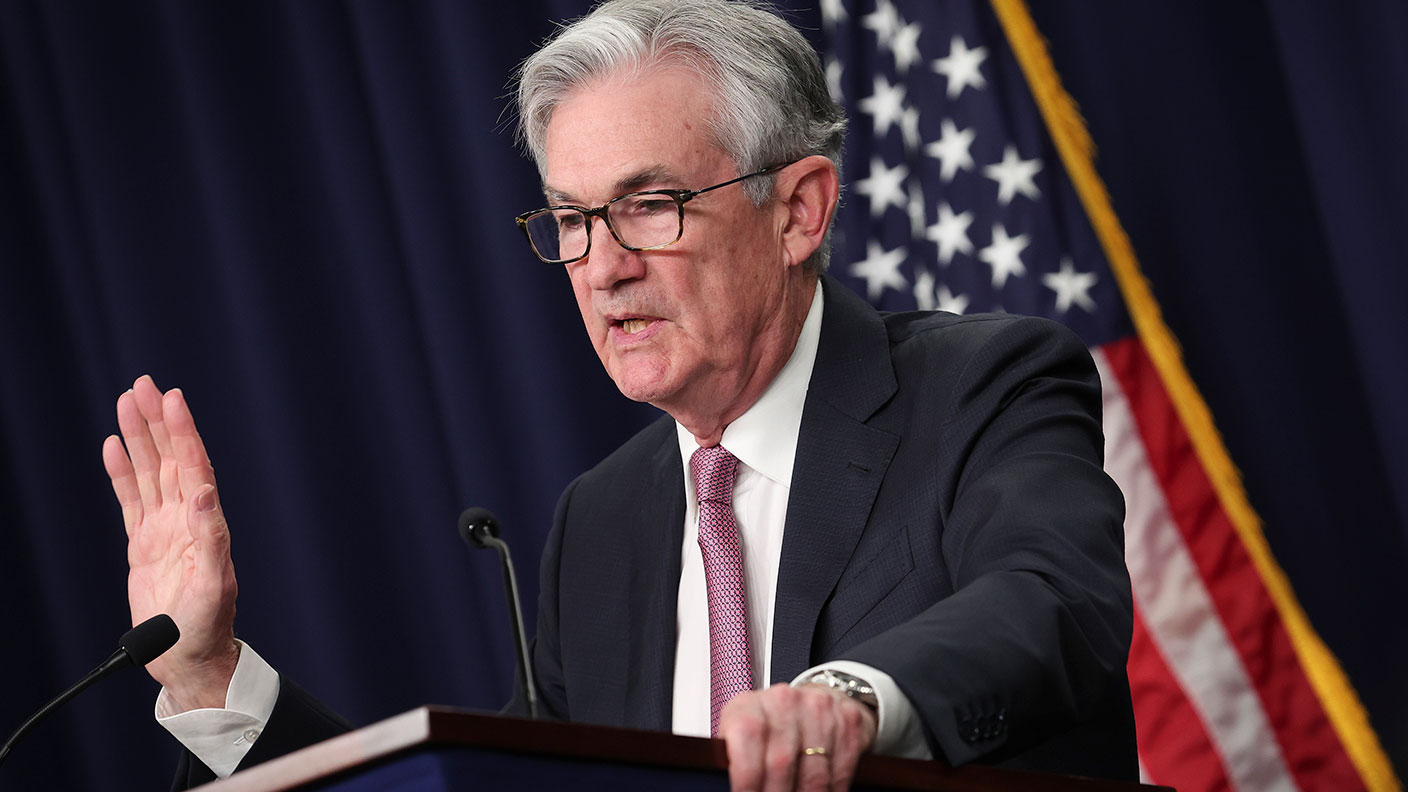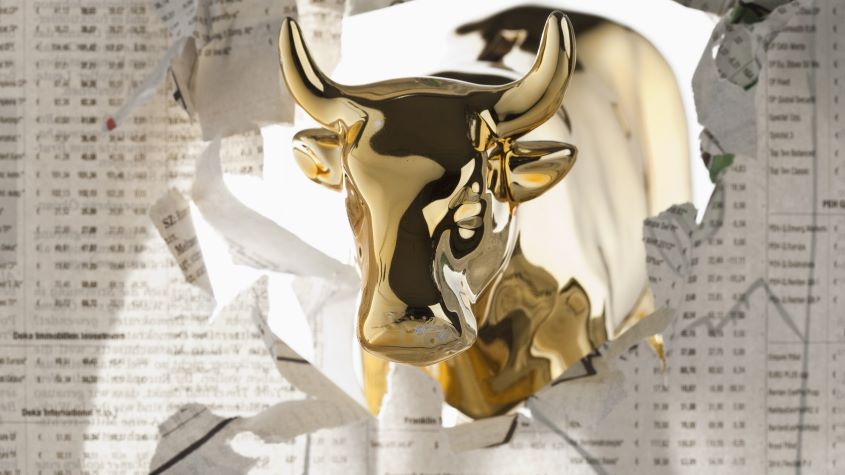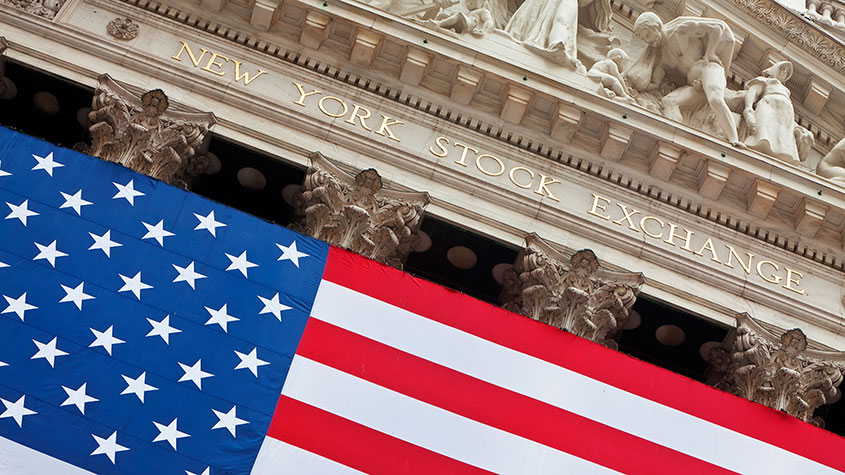Here’s why markets welcomed America’s big interest rate rise
The US Federal Reserve raised interest rates by half a percentage point – the biggest hike in 20 years. So why did markets rise? John Stepek explains what's going on, and what it might mean for you.


Get the latest financial news, insights and expert analysis from our award-winning MoneyWeek team, to help you understand what really matters when it comes to your finances.
You are now subscribed
Your newsletter sign-up was successful
Want to add more newsletters?

Twice daily
MoneyWeek
Get the latest financial news, insights and expert analysis from our award-winning MoneyWeek team, to help you understand what really matters when it comes to your finances.

Four times a week
Look After My Bills
Sign up to our free money-saving newsletter, filled with the latest news and expert advice to help you find the best tips and deals for managing your bills. Start saving today!
Yesterday the Federal Reserve – the US central bank – raised US interest rates by a whopping half a percentage point.
Markets promptly leapt higher, seemingly overjoyed at the biggest rate hike seen in more than two decades.
A year ago, this is not a pair of sentences that you’d have expected to see co-existing in the wild, without one of them being false.
MoneyWeek
Subscribe to MoneyWeek today and get your first six magazine issues absolutely FREE

Sign up to Money Morning
Don't miss the latest investment and personal finances news, market analysis, plus money-saving tips with our free twice-daily newsletter
Don't miss the latest investment and personal finances news, market analysis, plus money-saving tips with our free twice-daily newsletter
Yet these are the strange times we live in – better get used to them.
Markets are relieved that the Fed didn’t raise rates by even more
The Federal Reserve raised the federal funds rate (the US equivalent of the Bank of England rate) to “between 0.75% and 1%”. That was a half-percentage point increase.
It also confirmed that it is swapping quantitative easing (QE) for quantitative tightening (QT). The Fed won’t be actively selling bonds (not yet, at least). Instead it will allow bonds it already owns to mature without reinvesting the proceeds.
The S&P 500 – the main US index – rose by more than 3% (which was very much a direct result of the Fed’s move and the subsequent press conference).
Why the cheery reaction to something that would as recently as a year ago probably precipitated an epic slide?
Put simply, it just wasn’t as bad as it could have been. Markets are all about expectations – the whole purpose of markets is to price risk efficiently.
On that front, investors were already expecting a half-point rise, so that was already in the price.
But what was also in the price, as a “low odds but still frightening” scenario, was the idea that the Fed would raise rates by three-quarters of a percentage point, rather than just a half.
So this was a relief rally. The Fed has no intention of stopping raising rates, but the fear that it would go full-on inflation warrior with no regard to triggering a recession was also put to bed.
Instead, Fed boss Jerome Powell said there will be more half-point rises in the meetings to come, and that while it would be a tricky task, he was hopeful of a “soft-ish” landing.
Long story short, rates are still rising, and the Fed has not yet been sufficiently rattled by market tantrums to change its tone. But the worst-case scenario (from a market point of view) was taken off the table.
That’s what triggered the stockmarket rally, not to mention a dip in the dollar and even a bit of a rebound in gold.
Why should you care as a UK investor?
To get a little more specific: why does all of this matter for a UK investor (assuming that’s what you are)? After all, isn’t today’s Bank of England rate decision more important?
Well, yes and no. The Bank of England move has more of an effect on your mortgage, certainly, especially if you have a standard variable rate (which you shouldn’t have – see here for more on mortgage rates and why now might be a sensible time to fix).
But in terms of global stockmarkets – which is where at least a chunk, quite possibly a very big chunk, of your pension money is sitting – the Fed is the one central bank to rule them all, as Tolkein probably wouldn’t have put it.
Why does the Fed matter so much? Primarily because the Fed is the custodian of the US dollar. And the US dollar is the most important currency in the world.
And right now, as my colleague Dominic wrote yesterday, the US dollar is at a critical juncture in terms of its strength relative to other global currencies.
Here’s the issue: everyone needs US dollars, and when US dollars get more expensive, dollars are harder to come by. In other words, when the US dollar is getting stronger, monetary policy for the world is getting tighter.
When monetary conditions tighten, “risk-on” assets (that is, the sorts of assets people buy when they feel comfortable taking risk) tend to go down. “Risk-off” assets, by contrast, go up.
Sterling – believe it or not – is a “risk-on” asset. Again, simplifying somewhat, this is because it is backed by a highly-financialised economy rather than one built on commodity exports or a healthy national balance sheet.
A weak pound adds to the inflationary pressures we’ve been feeling. But a stronger currency usually implies pushing interest rates higher, and if your economy is not in a fit state to cope, that makes for a very tricky balancing act.
So, all else being equal, a slightly more relaxed Fed takes some pressure off the Bank of England and other central banks to keep up in terms of rate increases.
As for the rest of your portfolio – well, as Dominic points out, if you’re an investor, you probably would prefer to see the US dollar weaken from here rather than rocket higher.
The question is: is this just a lull? The calm before the storm? And there, I have to say, the jury is out.
Markets had been pricing in much tighter monetary conditions; the scary scenario was arguably “overbought”. The US dollar had moved up too quickly, and bond prices had fallen too fast.
But while the market might need a breather, it’s not obvious that the overall direction has changed yet. Unless recession risk rises obviously, or inflation looks as though it’s peaking – either of which would offer the Fed an excuse for erring on the side of dovishness – there’s a definite risk that markets will find themselves panicking again before too long.
SEE ALSO:
If the US dollar keeps rising from here, it’s going to hurt
Get the latest financial news, insights and expert analysis from our award-winning MoneyWeek team, to help you understand what really matters when it comes to your finances.

-
 Can mining stocks deliver golden gains?
Can mining stocks deliver golden gains?With gold and silver prices having outperformed the stock markets last year, mining stocks can be an effective, if volatile, means of gaining exposure
-
 8 ways the ‘sandwich generation’ can protect wealth
8 ways the ‘sandwich generation’ can protect wealthPeople squeezed between caring for ageing parents and adult children or younger grandchildren – known as the ‘sandwich generation’ – are at risk of neglecting their own financial planning. Here’s how to protect yourself and your loved ones’ wealth.
-
 Is it different this time for Japanese stocks?
Is it different this time for Japanese stocks?Analysis Nikkei 225 Index has jumped 19.8% this year, and there are signs the rally could continue.
-
 As China reopens, why pick an income strategy?
As China reopens, why pick an income strategy?Advertisement Feature Yoojeong Oh, Investment Manager, abrdn Asian Income Fund Limited
-
 Is Japan the best market to invest in now?
Is Japan the best market to invest in now?Opinion Japan puts Western economies to shame and offers good value for both equity and bond investors, says Max King.
-
 The highest yielding S&P 500 Dividend Aristocrats
The highest yielding S&P 500 Dividend AristocratsTips Dividends are a key component of investment returns in the long-term. A portfolio of dividend aristocrats is a great way to build wealth and a sustainable income stream.
-
 2023 will be a bumper year for stocks. Here’s how to play the rally
2023 will be a bumper year for stocks. Here’s how to play the rallyTips Dominic Frisby explains why he thinks the market rally could have further to run in 2023 despite macroeconomic headwinds
-
 A new dawn for Asian markets?
A new dawn for Asian markets?Advertisement Feature James Thom, Investment Manager, abrdn New Dawn Investment Trust plc
-
 China’s post-covid investment boom off to a slow start. Should you still invest in China?
China’s post-covid investment boom off to a slow start. Should you still invest in China?Advice Investors are no longer bullish on the China shop but the gloomy consensus on Beijing’s economy might be unfair. Should you invest in China?
-
 Stock market crash? This time it’s (slightly) different
Stock market crash? This time it’s (slightly) differentOpinion The bears expecting a stock market crash have got it wrong, says Max King.